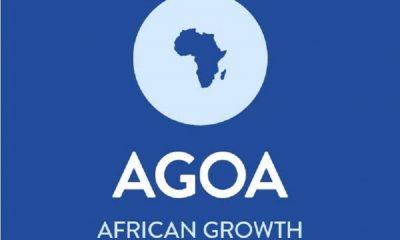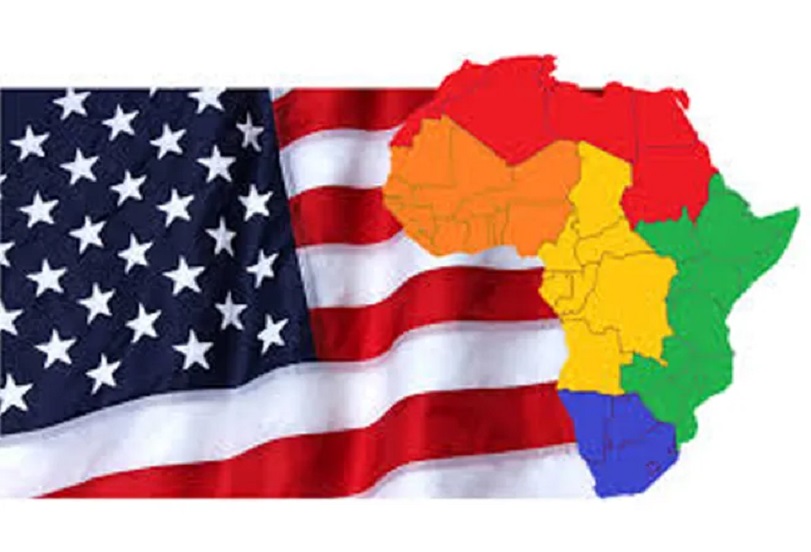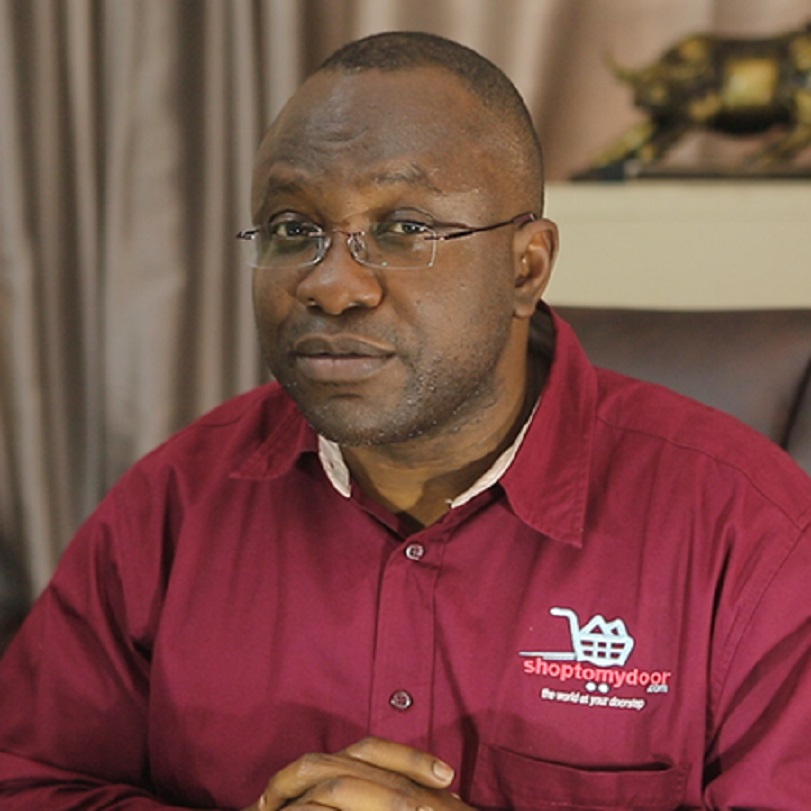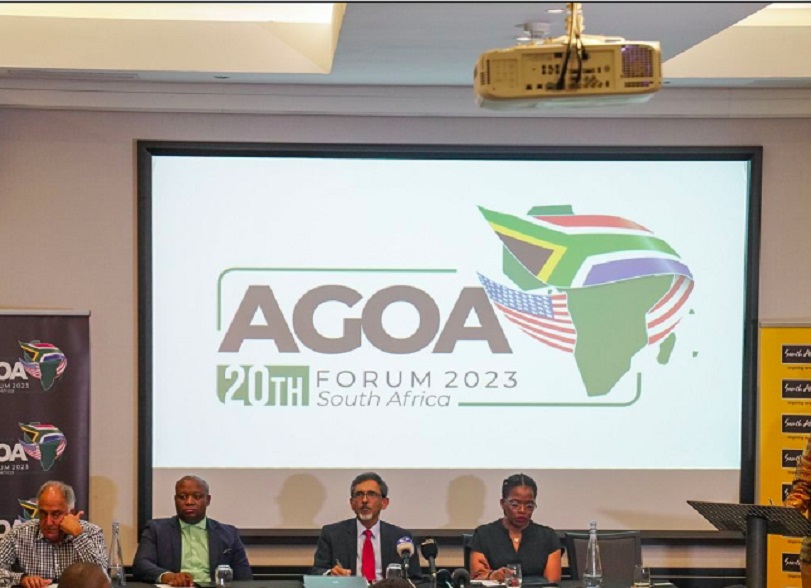World
US-Africa Trade and Economic Cooperation: Challenges and Future Pathways
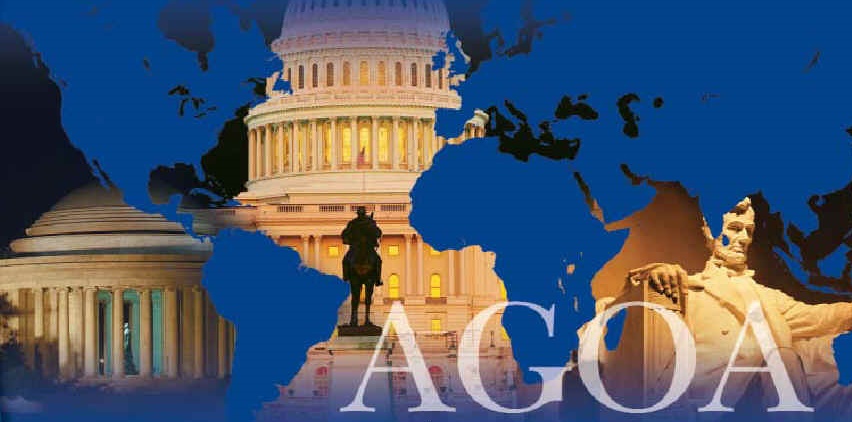
By Kestér Kenn Klomegâh
The United States government hosted trade ministers from sub-Saharan Africa for the annual African Growth and Opportunity Act (AGOA) Forum from July 24 to 26. Since its (AGOA) launch in 2000, this important corporate event has taken place alternately in Washington or an African city each year. Last year, it was held in South Africa. The Forum took place in Washington against the backdrop of geopolitical changes, and during an election period in the United States.
Ahead of the Forum, on July 23 there was an official statement from President Joe Biden on the African Growth and Opportunity Act (AGOA) Forum in Washington that called on Congress to quickly reauthorize and modernize this landmark Act—which is set to expire in 2025. That America is all in on Africa. Together, let’s ensure that future generations of Americans and Africans can meet the challenges and seize the opportunities of the decades ahead.
“For more than two decades, the bipartisan African Growth and Opportunity Act has formed the bedrock of America’s economic partnership with African nations. Sub-Saharan Africa has increased the competitiveness of African products, led to the creation of tens of thousands of quality jobs, and helped advance human rights. Here at home, AGOA has created investment opportunities and new markets for American businesses. And on both sides of the Atlantic, AGOA has promoted sustainable economic growth and resilient supply chains,” President Joe Biden said in the statement.
United States Trade Representative, Ambassador Katherine Tai, at the opening ceremony of the 21st Africa Growth and Opportunity Act Forum, in the presence of African finance ministers, heads of delegation from AGOA partner countries, Secretaries-General and Commissioners of the Regional Economic Communities and the African Union, acknowledged the extraordinary collaborative job done by the African Union, the Regional Economic Communities and together with Africa’s Finance Ministers. For the last three years, the Biden-Harris Administration has focused on measures to deepen trade and strengthen economic cooperation, she said in a quick assessment in terms of performance and results.
“When President Biden asked me to serve as his Trade Representative, he gave me a directive—to use trade for the common good. This means putting workers at the centre of our trade policy because they are the backbone and engine of our economy. This also means expanding the table and lifting more voices, especially those of women, youth, the African Diaspora, and communities that have been historically overlooked. This is how we are democratizing economic opportunity and transforming the role of trade in the social contract between our government and our people,” she explained in her speech at the 21st AGOA ministerial meeting held on July 25 in Washington.
These core beliefs are the centrepiece of the trade relationship with Africa—especially AGOA. Washington officials consider AGOA’s success to date as an unshakeable potential for a new era, as a driving force to strengthen trade with Africa. And next, Africa possesses tremendous opportunity and potential. The officials further acknowledged that the world is very different from when AGOA was first enacted 24 years ago. That is why the Biden-Harris Administration not only supports the reauthorization of AGOA but also the strengthening and improvement of it to fit the rapidly changing times.
As one of the strategic steps, AGOA is closely working with the African Continental Free Trade Area (AfCFTA) Secretariat. Besides that, AGOA is also working on a bilateral basis with many African countries, for instance with Kenya on the Strategic Trade and Investment Partnership. It has a trade collaboration with South Africa. The forward-looking model for engagement with the continent is to make AGOA more inclusive, responsive, and transformative—for all segments of the society. The simple proposition that is to capture, within the context of the geopolitical situation, both the current realities and future possibilities.
The ministerial program featured plenary sessions on the present and future of AGOA and U.S.–Africa trade and investment cooperation, as well as sessions on various topics. It was preceded by a Civil Society and Organized Labor Forum and a Private Sector Forum. It brought together senior government officials from the United States and AGOA-eligible countries, as well as representatives from continental and regional economic organizations, labour, civil society, and the private sector. Under the theme “Beyond 2025: Reimagining AGOA for an Inclusive, Sustainable and Prosperous Tomorrow,” the U.S. delegation underscored the United States’ commitment to the AGOA program and led discussions on a broad range of topics, including using AGOA to drive more inclusive and sustainable economic development for Africans and Americans and further strengthen U.S.-Africa economic relations.
During the AGOA Forum, Ambassador Tai facilitated a session with Members of Congress and African ministers on AGOA reauthorization. She also held bilateral meetings with African Union Trade Commissioner Albert Muchanga; Ghana’s Minister of Trade and Industry Kobina Tahir Hammond; Nigeria’s Minister of Industry, Trade and Investment Dr. Doris Uzoka-Anite; and South Africa’s Minister of Trade, Industry and Competition Parks Tau.
Chief Agricultural Negotiator Ambassador Doug McKalip met with Angola’s Secretary for Economic Affairs Milton Parmédio dos Santos Reis and Mauritius’ Ambassador N. Chedumbarum, Head of the Economic Directorate at the Ministry of Foreign Affairs, Regional Integration, and International Trade. Assistant U.S. Trade Representative for African Affairs Constance Hamilton met with Rwanda’s Minister of Trade and Industry Dr. Jean-Chrysostome Ngabitsinze and Kenya’s Principal Secretary for Trade Alfred K’Ombudo.
AGOA Forum participants included trade ministers from 32 AGOA-eligible countries. The U.S. delegation included Members of Congress and professional staff from the United States Congress, and senior government officials from the Department of State, the Department of Commerce, the Department of the Treasury, the U.S. Agency for International Development, the Department of Health and Human Services, the Department of Agriculture, the Department of Labor, the Export-Import Bank of the United States, Prosper Africa, the Small Business Administration, the United States Trade and Development Agency, the United States International Development Finance Corporation, the Millennium Challenge Corporation, the Office of the U.S. Trade Representative, and the National Security Council.
Last November in Johannesburg, South Africa, AGOA held its 20th Forum and sent a powerful reminder about the giant roadmap to integrate the United States’ economic cooperation and trade with the African Continental Free Trade Area (AfCFTA). It plans to share common goals and corporate aspirations and to chart a path of transforming and modernizing partnerships.
The Corporate Council on Africa (CCA) expressed extremely optimistic views about the future. It shared an intertwined and inseparable history of America and Africa. This is foundational for the Biden-Harris Administration and it’s foundational for AGOA itself. The American and African companies, the private sector operators, and the African Diaspora that in this next era of AGOA be more transformative, for more people across the continent, and along the way, build a stronger productive and meaningful partnership between the United States and sub-Saharan Africa.
The Corporate Council on Africa (CCA), the leading US business association, focuses solely on connecting business interests in Africa. In 2023, CCA organized a business summit which was a tremendous success in Botswana, southern Africa. The participants – most importantly – private sector corporate executives looked at Africa and the United States in strategic dialogue on the key issues and opportunities driving U.S.-Africa trade, investment, and commercial engagement.
Dr Barbara A. Perkins, Co-Founder and President of the International Black Women’s Public Policy Institute, looked at her organization working to empower Black women from the diaspora, across a lot of different public policy areas, to become leaders. At this point of global development, given the opportunity that there is the necessity to move women professionals, with all of the change in the world, it is a particularly special moment for exploring new pathways and new ways of doing things with the most important partners across Africa. These include women entrepreneurs, and women in politics, and generally to empower them wherever they are and whatever they do – to be an incredibly important part of the program, its enormous economic potential and discover so many common values – in Africa. Worth noting that African partners share a vision around more inclusive, sustainable, durable trade policies that inform economic growth, opportunities, and industrialization.
For three solid working days, the gathering had conversations relating to how to transform the multilateral trading system to benefit more people, particularly underserved communities. It examined various ways to modernize the legislation to the benefit of people across Africa and in America. It further looked at how trade can and must help craft a fairer and more equitable future for Africa – delivering real opportunities across all segments of societies, including women, youth, the African Diaspora, and other underserved groups. The workers and their families. The women business owners. The tech entrepreneurs. Young musicians. Farmers using climate-smart agriculture. And many more. In the practical long-term, AGOA has been a bedrock to improve the livelihoods of so many people.
Over the past few years, African leaders have been advocating for large-scale structural reforms, financial inadequacies and policy approaches by multinational institutions mostly dominated by the United States. The leaders have consistently been arguing for better development finance strategies and questioned the substance of using the U.S. currency. The majority of the leaders expressed support for ‘de-dollarization’ in their external trade operations, and yet gearing to strengthen trade with Europe and the United States.
By design AGOA, for example, is a useful mechanism for improving accessibility to boost trade, competitiveness, connectivity, and productivity. With evolving contradictions and complexities, it is the right moment to capitalize on the available potential capital for accelerating development. Further to that, Africa has to strengthen its foreign revenue sources from markets where the currency has value and is convertible. Therefore, the late July 2024, African ministerial summit was devoted to review thoroughly the benefits of the African Growth and Opportunity Act (AGOA).
Some African strategists and research analysts indisputably believe that remittance flows are definitely one of the surest reliable sources of foreign exchange, depending solely on the dollar currency, to support trade. In its latest report in June, the World Bank indicated that, despite the geopolitical uncertainties, instability and challenges, sub-Saharan Africa’s remittance flow reached $54 billion in 2023. Looking ahead for ensuring trade between the United States and Africa therefore requires reviewing measures such as trade policy, trade facilitation, productive capacity, trade-related infrastructure, trade finance, trade information and factor-market integration. President Joe Biden has also created the African Diaspora Advisory Council as part of the presidency. It has been working closely together to deepen and fortify America’s strategic partnerships with the African diaspora in the interests of sustaining meaningful stability between Africa and the United States.
Over the past 24 years, AGOA has made a tangible difference for millions of people in Africa. New jobs. New business opportunities. New hope. AGOA has not only strengthened economic relations with the United States but also has helped create African-led solutions to the region’s challenges. And importantly, AGOA has created a community of policymakers, civil society, and business leaders, dedicated to using this forum to better the lives of everyday people. The program provides duty-free access to the US market for nearly 2,000 products from eligible countries. US imports under AGOA topped $9.7 billion last year.
Remarks by Assistant U.S. Trade Representative for African Affairs, Constance Hamilton, at the closing ceremony emphasized that the United States, as a genuine partner, is partnering for an open and fair society. Partnering for economic empowerment and inclusive prosperity—for all people. Hamilton referred to the US President’s statement. As President Biden said, “In so many ways, Africa is the future—and so when Africa succeeds, the whole world succeeds.” By 2050, one in four people in the entire world will be in Africa. That means what happens in Africa impacts the entire world.
“AGOA has played an instrumental role in realizing this vision. This is why the Biden-Harris Administration is all in on Africa,” he underlined. “We explored barriers that women, youth, MSMEs, and the African Diaspora face in accessing trade and investment opportunities and how we can use the AGOA more effectively to drive inclusive and sustainable economic growth. We explored how to better use the multilateral trading system to benefit more people, particularly underserved communities. We also discussed opportunities to modernize the AGOA program to realize its full potential as a tool for development and regional economic integration. And we discussed how the United States and AGOA partners can collectively create and promote stronger high-standard investment opportunities.”
At this point, it is just important to reiterate that AGOA primarily offers African exporters and agencies to collaborate broadly on exportable goods and services as revenue sources from the United States market. It further emphasizes the importance of enhancing bilateral investments, promoting economic growth, and creating opportunities for local businesses and entrepreneurs across Africa. AGOA, as a gateway for addressing trade and investment obstacles in the continent, is due to be extended until 2041, plus a push to align AGOA closer to the Africa Continental Free Trade Agreement, which would involve opening up the program to North African countries. This was one of the results, among others, which emerged from Washington.
Crafting the future partnership largely depends on the collective efforts by the AGOA statutory U.S. agencies – including State, Treasury, Commerce and USAID – and the entire U.S. government inter-agency, and the private sector, civil society and labour stakeholders, and many other corporate entrepreneurial NGOs affiliated to AGOA. The Biden-Harris Administration is seriously committed to working on new challenges and opportunities for continued success in the coming years to impact positively on real lives across the continent. AGOA remains the cornerstone of the U.S. economic partnership with Africa.
World
African Visual Art is Distinguished by Colour Expression, Dynamic Form—Kalalb

By Kestér Kenn Klomegâh
In this insightful interview, Natali Kalalb, founder of NAtali KAlalb Art Gallery, discusses her practical experiences of handling Africa’s contemporary arts, her professional journey into the creative industry and entrepreneurship, and also strategies of building cultural partnership as a foundation for Russian-African bilateral relations. Here are the interview excerpts:
Given your experience working with Africa, particularly in promoting contemporary art, how would you assess its impact on Russian-African relations?
Interestingly, my professional journey in Africa began with the work “Afroprima.” It depicted a dark-skinned ballerina, combining African dance and the Russian academic ballet tradition. This painting became a symbol of cultural synthesis—not opposition, but dialogue.
Contemporary African art is rapidly strengthening its place in the world. By 2017, the market was growing so rapidly that Sotheby launched its first separate African auction, bringing together 100 lots from 60 artists from 14 foreign countries, including Algeria, Ghana, Mali, Nigeria, Senegal, and others. That same year during the Autumn season, Louis Vuitton Foundation in Paris hosted a major exhibition dedicated to African art. According to Artnet, sales of contemporary African artists reached $40 million by 2021, a 434% increase in just two years. Today, Sotheby holds African auctions twice a year, and in October 2023, they raised $2.8 million.
In Russia, this process manifests itself through cultural dialogue: exhibitions, studios, and educational initiatives create a space of trust and mutual respect, shaping the understanding of contemporary African art at the local level.
Do you think geopolitical changes are affecting your professional work? What prompted you to create an African art studio?
The international context certainly influences cultural processes. However, my decision to work with African themes was not situational. I was drawn to the expressiveness of African visual language—colour, rhythm, and plastic energy. This theme is practically not represented systematically and professionally in the Russian art scene.
The creation of the studio was a step toward establishing a sustainable platform for cultural exchange and artistic dialogue, where the works of African artists are perceived as a full-fledged part of the global cultural process, rather than an exotic one.
To what extent does African art influence Russian perceptions?
Contemporary African art is gradually changing the perception of the continent. While previously viewed superficially or stereotypically, today viewers are confronted with the depth of artistic expression and the intellectual and aesthetic level of contemporary artists.
Portraits are particularly impactful: they allow us to see not just an abstract image of a “continent,” but a concrete personality, character, and inner dignity. Global market growth data and regular auctions create additional trust in African contemporary art and contribute to its perception as a mature and valuable movement.
Does African art reflect lifestyle and fashion? How does it differ from Russian art?
African art, in my opinion, is at its peak in everyday culture—textiles, ornamentation, bodily movement, rhythm. It interacts organically with fashion, music, interior design, and the urban environment. The Russian artistic tradition is historically more academic and philosophical. African visual art is distinguished by greater colour expression and dynamic form. Nevertheless, both cultures are united by a profound symbolic and spiritual component.
What feedback do you receive on social media?
Audience reactions are generally constructive and engaging. Viewers ask questions about cultural codes, symbolism, and the choice of subjects. The digital environment allows for a diversity of opinions, but a conscious interest and a willingness to engage in cultural dialogue are emerging.
What are the key challenges and achievements of recent years?
Key challenges:
- Limited expert base on African contemporary art in Russia;
- Need for systematic educational outreach;
- Overcoming the perception of African art as exclusively decorative or ethnic.
Key achievements:
- Building a sustainable audience;
- Implementing exhibition and studio projects;
- Strengthening professional cultural interaction and trust in African
contemporary art as a serious artistic movement.
What are your future prospects in the context of cultural diplomacy?
Looking forward, I see the development of joint exhibitions, educational programs, and creative residencies. Cultural diplomacy is a long-term process based on respect and professionalism. If an artistic image is capable of uniting different cultural traditions in a single visual space, it becomes a tool for mutual understanding.
World
Ukraine Reveals Identities of Nigerians Killed Fighting for Russia

By Adedapo Adesanya
The Ukrainian Defence Intelligence (UDI) has identified two Nigerian men, Mr Hamzat Kazeem Kolawole and Mr Mbah Stephen Udoka, allegedly killed while fighting as Russian mercenaries in the war between the two countries ongoing since February 2022.
The development comes after Russia denied knowledge of Nigerians being recruited to fight on the frontlines.
Earlier this week, the Russian Ambassador to Nigeria, Mr Andrey Podyolyshev, said in Abuja that he was not aware of any government-backed programme to recruit Nigerians to fight in the war in Ukraine.
He said if at all such activity existed, it is not connected with the Russian state.
However, in a statement on Thursday, the Ukrainian Defence released photographs of Nigerians killed while defending Russia.
“In the Luhansk region, military intelligence operatives discovered the bodies of two citizens of the Federal Republic of Nigeria — Hamzat Kazeen Kolawole (03.04.1983) and Mbah Stephen Udoka (07.01.1988),” the statement read.
According to the statement, both men served in the 423rd Guards Motor Rifle Regiment (military unit 91701) of the 4th Guards Kantemirovskaya Tank Division of the armed forces of the Russian Federation.
UDI said that they signed contracts with the Russian Army in the second half of 2025 – the deceased Mr Kolawole on August 29 and Mr Udoka on September 28.
“Udoka received no training whatsoever — just five days later, on October 3, he was assigned to the unit and sent to the temporarily occupied territories of Ukraine,” the report read.
It added that no training records for Mr Kolawole have been preserved; however, it is highly likely that he also received no military training, but his wife and three children remain in Nigeria.
Both Nigerians, the report added, were killed in late November during an attempt to storm Ukrainian positions in the Luhansk region.
“They never engaged in a firefight — the mercenaries were eliminated by a drone strike,” UDI stated, warning foreign citizens against travelling to the Russian Federation or taking up any work on the territory of the “aggressor state”.
“A trip to Russia is a real risk of being forced into a suicide assault unit and, ultimately, rotting in Ukrainian soil,” the statement read.
In an investigation earlier this month, CNN reported that hundreds of African men have been enticed to fight for Russia in Ukraine with the promise of civilian jobs and high salaries. However, the media organisation uncovered that they are being deceived or sent to the front lines with little combat training.
CNN said it reviewed hundreds of chats on messaging apps, military contracts, visas, flights and hotel bookings, as well as gathering first-hand accounts from African fighters in Ukraine, to understand just how Russia entices African men to bolster its ranks.
World
Today’s Generation of Entrepreneurs Value Flexibility, Autonomy—McNeal-Weary

By Kestér Kenn Klomegâh
The Young African Leaders Initiative (YALI) is the United States’ signature step to invest in the next generation of African leaders. Since its establishment in 2010 by Obama administration, YALI has offered diverse opportunities, including academic training in leadership, governance skills, organizational development and entrepreneurship, and has connected with thousands of young leaders across Africa. This United States’ policy collaboration benefits both America and Africa by creating stronger partnerships, enhancing mutual prosperity, and ensuring a more stable environment.
In our conversation, Tonya McNeal-Weary, Managing Director at IBS Global Consulting, Inc., Global Headquarters in Detroit, Michigan, has endeavored to discuss, thoroughly, today’s generation of entrepreneurs and also building partnerships as a foundation for driving positive change and innovation in the global marketplace. Here are the excerpts of her conversation:
How would you describe today’s generation of entrepreneurs?
I would describe today’s generation of entrepreneurs as having a digital-first mindset and a fundamental belief that business success and social impact can coexist. Unlike the entrepreneurs before them, they’ve grown up with the internet as a given, enabling them to build global businesses from their laptops and think beyond geographic constraints from day one. They value flexibility and autonomy, often rejecting traditional corporate ladders in favor of building something meaningful on their own terms, even if it means embracing uncertainty and financial risk that previous generations might have avoided.
And those representing the Young African Leaders Initiative, who attended your webinar presentation late January 2026?
The entrepreneurs representing the Young African Leaders Initiative are redefining entrepreneurship on the continent by leveraging their unique perspectives, cultural heritage, and experiences. Their ability to innovate within local contexts while connecting to global opportunities exemplifies how the new wave of entrepreneurs is not confined by geography or conventional expectations.
What were the main issues that formed your ‘lecture’ with them, Young African Leaders Initiative?
The main issues that formed my lecture for the Young African Leaders Initiative were driven by understanding the importance of building successful partnerships when expanding into the United States or any foreign market. During my lecture, I emphasized that forming strategic alliances can help entrepreneurs navigate unfamiliar business environments, access new resources, and foster long-term growth. By understanding how to establish strong and effective partnerships, emerging leaders can position their businesses for sustainable success in global markets. I also discussed the critical factors that contribute to successful partnerships, such as establishing clear communication channels, aligning on shared goals, and cultivating trust between all parties involved. Entrepreneurs must be proactive in seeking out partners who complement their strengths and fill gaps in expertise or resources. It is equally important to conduct thorough due diligence to ensure that potential collaborators share similar values and ethical standards. Ultimately, the seminar aimed to empower YALI entrepreneurs with practical insights and actionable strategies for forging meaningful connections across borders. Building successful partnerships is not only a pathway to business growth but also a foundation for driving positive change and innovation in the global marketplace.
What makes a ‘leader’ today, particularly, in the context of the emerging global business architecture?
In my opinion, a leader in today’s emerging global business architecture must navigate complexity and ambiguity with a fundamentally different skill set than what was previously required. Where traditional leadership emphasized command-and-control and singular vision, contemporary leaders succeed through adaptive thinking and collaborative influence across decentralized networks. Furthermore, emotional intelligence has evolved from a soft skill to a strategic imperative. Today, the effective modern leader must possess deep cross-cultural intelligence, understanding that global business is no longer about exporting one model worldwide but about genuinely integrating diverse perspectives and adapting to local contexts while maintaining coherent values.
Does multinational culture play in its (leadership) formation?
I believe multinational culture plays a profound and arguably essential role in forming the kind of leadership required in today’s global business environment. Leaders who have lived, worked, or deeply engaged across multiple cultural contexts develop a cognitive flexibility that’s difficult to replicate through reading or training alone. More importantly, multinational exposure tends to dismantle the unconscious certainty that one’s own way of doing things is inherently “normal” or “best.” Leaders shaped in multicultural environments often develop a productive discomfort with absolutes; they become more adept at asking questions, seeking input, and recognizing blind spots. This humility and curiosity become strategic assets when building global teams, entering new markets, or navigating geopolitical complexity. However, it’s worth noting that multinational experience alone doesn’t automatically create great leaders. What matters is the depth and quality of cross-cultural engagement, not just the passport stamps. The formation of global leadership is less about where someone has been and more about whether they’ve developed the capacity to see beyond their own cultural lens and genuinely value differences as a source of insight rather than merely tolerating them as an obstacle to overcome.
In the context of heightening geopolitical situation, and with Africa, what would you say, in terms of, people-to-people interaction?
People-to-people interaction is critically important in the African business context, particularly as geopolitical competition intensifies on the continent. In this crowded and often transactional landscape, the depth and authenticity of human relationships can determine whether a business venture succeeds or fails. I spoke on this during my presentation. When business leaders take the time for face-to-face meetings, invest in understanding local priorities rather than imposing external agendas, and build relationships beyond the immediate transaction, they signal a different kind of partnership. The heightened geopolitical situation actually makes this human dimension more vital, not less. As competition increases and narratives clash about whose model of development is best, the businesses and nations that succeed in Africa will likely be those that invest in relationships characterized by reciprocity, respect, and long-term commitment rather than those pursuing quick wins.
How important is it for creating public perception and approach to today’s business?
Interaction between individuals is crucial for shaping public perception, as it influences views in ways that formal communications cannot. We live in a society where word-of-mouth, community networks, and social trust areincredibly important. As a result, a business leader’s behavior in personal interactions, their respect for local customs, their willingness to listen, and their follow-through on commitments have a far-reaching impact that extends well beyond the immediate meeting. The geopolitical dimension amplifies this importance because African nations now have choices. They’re no longer dependent on any single partner and can compare approaches to business.
From the above discussions, how would you describe global business in relation to Africa? Is it directed at creating diverse import dependency?
While it would be too simplistic to say global business is uniformly directed at creating import dependency, the structural patterns that have emerged often produce exactly that outcome, whether by design or as a consequence of how global capital seeks returns. Global financial institutions and trade agreements have historically encouraged African nations to focus on their “comparative advantages” in primary commodities rather than industrial development. The critical question is whether global business can engage with Africa in ways that build productive capacity, transfer technology, develop local talent, and enable countries to manufacture for themselves and for export—or whether the economic incentives and power irregularities make this structurally unlikely without deliberate policy intervention.
-

 Feature/OPED6 years ago
Feature/OPED6 years agoDavos was Different this year
-
Travel/Tourism10 years ago
Lagos Seals Western Lodge Hotel In Ikorodu
-

 Showbiz3 years ago
Showbiz3 years agoEstranged Lover Releases Videos of Empress Njamah Bathing
-

 Banking8 years ago
Banking8 years agoSort Codes of GTBank Branches in Nigeria
-

 Economy3 years ago
Economy3 years agoSubsidy Removal: CNG at N130 Per Litre Cheaper Than Petrol—IPMAN
-

 Banking3 years ago
Banking3 years agoSort Codes of UBA Branches in Nigeria
-

 Banking3 years ago
Banking3 years agoFirst Bank Announces Planned Downtime
-

 Sports3 years ago
Sports3 years agoHighest Paid Nigerian Footballer – How Much Do Nigerian Footballers Earn


